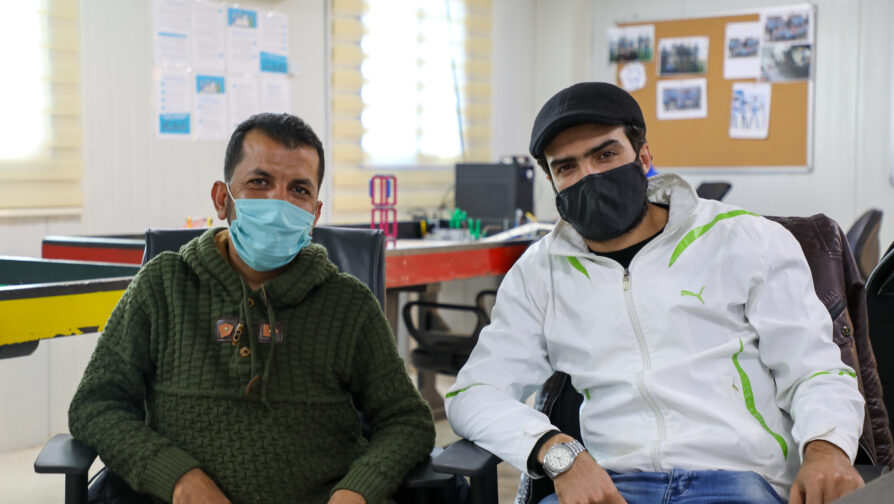From being the first refugee camp in the world to be powered by a solar plant to invent robotic hand sanitizers made of Lego to prevent the spread of the COVID 19 pandemic, Zaatari refugee camp in Jordan is renowned for its innovation. With 58 community centers which regularly run activities ranging from hydroponics to how to 3D print objects, it’s no wonder that refugees in the camp are constantly coming up with new ideas.
For the last five years, Ahmad and Youssef have been at the center of this creativity in the camp. After fleeing their homes back in Daraa, Syria, they initially met through putting on puppet shows for refugee children in the camp, raising awareness of child marriage and protection relation issues. But after constantly hearing about the problems and challenges their community was facing, they were increasingly motivated to develop solutions.

Ahmad (L) and Youssef (R) are picture in the Innovation Lab in Zaatari Refugee Camp
Ahmad in particular, was initially inspired by the difficulties he faced as a person with mobility disabilities in the camp, and so one of their first inventions was a smart design wheelchair.
“All our ideas are based on the challenges we see around us, or challenges people come to us with. As refugees there are always challenges, this is why there are always so many innovations in Zaatari.”
At the 2019 Global Refugee Forum, Governments and private sector partners had pledged their support to the Clean Energy Challenge to promote innovation for the greening of humanitarian responses around the world.
Given its expertise in the renewable energy sector, Norway had taken up the role as one of the main drivers of this challenge. While Jordan has been expanding its clean energy portfolio over recent years, it is estimated that the majority of the electricity generated in the Kingdom still comes from imported fossil fuels. This affects the price of electricity for the Jordanian consumer and results in high levels of carbon emissions that contribute to climate change. In addition, the influx of Syrian refugees, of which more than 80% reside in Jordanian host communities, has added to the rapidly increasing demand for electricity.
Thus, during the Norwegian Royal state visit to Jordan in March 2020, a ‘hackathon’ was organized to find innovative solutions to humanitarian and development challenges within the energy sector, in partnership with Zain, Innovation Norway, NRC, UNHCR, UNDP, the Jordan Entrepreneurship and Innovation Association (JEIA), the Global Green Growth Institute (GGGI) and the Crown Prince Foundation (CPF).
A new opportunity presented itself for refugees: “When we heard about the hackathon, we immediately signed up,” says Ahmad. “As refugees, we knew we had a unique perspective to offer,” adds Youssef.

The team work on the design of their invention during the hackathon.
After forming their team of six, all refugees from Zaatari Camp, under the name ‘Hope for Humans’, Ahmed and Youssef immediately started brainstorming ideas for the hackathon challenge: how to cheaply generate a satisfactory amount of electricity in the camp. As even though there is a solar-powered plant in Zaatari, the generated amount of energy is not enough to cover all the needs within the camp population.
Travelling to Amman to participate in the hackathon in the last two weeks of February, also provided additional inspiration as a result of interacting with different humanitarian organizations, the private sector and local Jordanians who were all taking part. “In Amman, we realized clearly that this was not just a challenge we were facing in the camp, but also one that communities around Jordan have,” says Ahmad.
Two weeks later, the team had just three minutes to present their solution in front of a panel made up of experts in the energy sector. Their prototype, a special tile that generates electrical energy using kinetic energy from a bicycle, or wind energy from a fan, using the piezoelectric effect won one of the main prizes.

Youssef, Ahmad and the Help for Humans team present their idea at the end of the Hackathon
“We were so excited,” says Ahmad, “and it was even better that we got to meet the Royals of Jordan and Norway when they presented the prizes.”
Following the hackathon, the team were awarded with a prize fund of 1,000 JOD (1,400 USD) to further develop their idea and also met with the Jordanian Ministry of Energy to discuss how they could potentially work together on the project. “The system we initially developed has enough energy to power a single household,” explains Youssef, “But with further investment and work, we can definitely expand it to work on a larger scale.”
Unfortunately, with the advent of the COVID19 pandemic, their plans for expansion have been put on hold for now but their creativity has certainly not stopped.
“Things have changed 180 degrees over the last eight months,” Ahmad says, “psychologically in the camp it has been difficult but by innovating and thinking of new ideas, we are trying to stay positive.”
Share on Facebook Share on Twitter